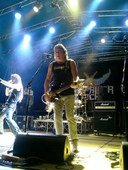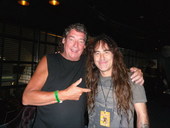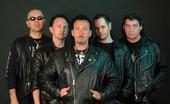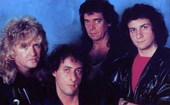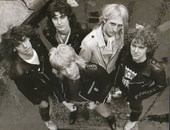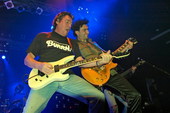Dennis Stratton
I Always Get on Better with the Engineer
20.10.2011
Архив интервью | Русская версияInterviewing Dennis Stratton, who used to play guitar in Iron Maiden, Praying Mantis and Lionheart, is a great gift for a fan of British rock music. Moreover, it was the addition of Dennis to the bill of Bulgaria’s Aero Rock Starz festival which made me travel to the event all the way from my home country. After leaving Praying Mantis in 2005, Dennis has been quite out of sight, and it was very interesting for me to ask him what was happening in his life over those years, as well as to talk about his involvement in Lionheart. Mr. Stratton turned out to be a very friendly person, but at the same time, he wasn’t shying away from calling a spade a spade.
Dennis, why did you decide to play these Maiden songs again?
Four or five years ago I was asked to go to Italy to play as a special guest for the Iron Maiden convention, which I did. There were fans who never ever saw the original line up because they were too young, it’s a new generation of fans. So when I arrived in Italy it was such a big show. So I’ve been going to Italy, France, Germany, I’ve been doing these Iron Maiden conventions because basically with the new fans that never saw the early line-up and the original members, it’s something for them to see. After I’d done Italy and Europe for about two years I was asked to go to South Africa. Originally I wanted to take with me the Italian band The Clairvoyants, they are a fantastic band, they play Iron Maiden songs perfectly, but they weren’t available. What happened was that I have a band in London whom I said, “Will you learn the set and we’ll go to South Africa?” They learned the set and we kept the set, which is a 50-minute set of the early Iron Maiden songs, mostly off the first album. We went to South Africa - very good, we came back and the word went around that I was doing this thing in South Africa. So they contacted us from Bulgaria and said, “Would you please to come to Bulgaria and play that set?” So that’s why I’m here.
But don’t you want to release a solo album with some new stuff?
The problem with that is after Iron Maiden I spent six years with Lionheart, we had original material them and we released the album with Lionheart. After Lionheart I spent 15 years with Praying Mantis and we released about eight albums. I left Praying Mantis in 2005 because I wasn’t in a full band. After leaving Praying Mantis in 2005 it was the first time I’ve ever been on my own. Even if I can write a few songs I’m constantly working in London with three bands and the work is very busy. I have not actually ventured into another band since Praying Mantis, so this is the first time because this is the band I play with in London, and we’re out doing the Iron Maiden set because we were asked. But if the opportunity came up to do a solo album, if there was a record company who wanted a solo album then it wouldn’t be a problem. But I wasn’t looking at that, I’d rather be working and playing.
Can you tell me a couple of words about your DVD “The Maiden Years”?
Mike de Jager, who runs Guitarist TV, came to South Africa with us for “The Maiden Years” tour. What happened was the fact he wanted to do a film, a DVD of my time with Iron Maiden. So he filmed it - we did some interviews and he recorded it - and he put it on his Guitarist TV. It wasn’t meant to be anything to sell or whatever, it was just something he wanted to do.
I have a couple of questions about your past. Can you tell me about your collaboration with Lea Hart on his solo albums? You contributed a couple of songs to them…
Yes, I did, but Lea Hart is a crook and a thief. He’s no good. What happened was he asked me to be involved with some recordings, he had the backing tracks too and he asked me to go to the studio. I went to the studio, I did some singing on some tracks, I played guitar on some tracks and I didn’t know he was going to release it. By releasing them he caused me a lot of trouble with Pony Canyon in Japan because I was with Praying Mantis at that time. Basically he released those albums without me knowing or without my permission. I’ve never got any money for it, so the man is a crook, he’s a thief.
I guess the situation with the mysterious band True Brits was the same, right?
Yeah, everything: English Steel, True Brits, NWOBHM All Stars – he brought out songs that he’d got people to record, but he never paid them, he never paid one person, so he is a thief.
The next question is about Paul Di’Anno…
(interrupts) I don’t wanna talk about Paul Di’Anno. He’s in a good place, he is in prison, that’s the best place for him.
But I believe you were a good pair of songwriters and did such great songs on “Made In Iron” album…
Yeah, but that was before he went silly. Let me put it this way: we [Praying Mantis] took Paul Di’Anno to Japan in 1990 because he wasn’t working – he was out of work, he wasn’t playing. We took him to Japan and we did the “Live At Last” album. When we came back from Japan, he slagged us, he called us names, he used the Internet to insult us badly and there was no need for that. We took him to Japan as a good friend but when we came back he insulted us on the Internet badly. I don’t have nothing to do with him.
Ok. Let’s speak about your band Lionheart, because I really like it. You formed this band in 1981 but the album “Hot Tonight” came out only 3 years later. Why did it take so long?
The reason is that unfortunately we couldn’t get a record deal. For four years we were in the studio writing songs, we were playing the Reading festival, we did support Whitesnake and Def Leppard but we couldn’t get a record deal. We ended up going to the studio with Def Leppard, with Girl, we did session work – we did backing vocals for many bands that had record deals, but we could never get it. Finally the demo tapes were taken to America to CBS, and we finally made a deal in America – not in England. It took us four years. We recorded our album in Los Angeles, then we went back from America and nothing happened. We were supposed to go on tour with REO Speedwagon, Kansas, Foreigner but it never happened. So the band was just left in limbo.
How did you get to know the singer Chad Brown who did such a great job on “Hot Tonight”?
Yeah, he’s got a great voice, but the production is not so good and the vocals is too loud, it’s so old-fashioned. I did a gig with him either when he was in Sweet or before Sweet, I can’t remember. But we got him down to the studio and let him sing on a couple of tracks, and it was just fantastic, so we kept him. (laughs)
Are you still in touch with Chad?
No. I think Steve Mann (guitars) is and I’m not sure if Rocky (Newton, bass) is. Rocky is here at the moment with X-UFO. Clive Edwards is here, he was drumming with Lionheart, the only who isn’t here is Steve Mann, he lives in Germany now.
Steve Mann plays with Michael Schenker and he has become really fat…
Really? I have him on Facebook, I’ll have a look at him. Steve was a fantastic musician who played keyboards and guitar in a fantastic way. Lionheart was me, Rocky and Steve, we were like brothers, very similar to me, Tino and Chris (the Troy brothers) being like brothers with Praying Mantis for 15 years, we were always together. It was the same with me, Rocky and Steve in Lionheart, we were always together.
Speaking about Lionheart, was it your idea to invite Kevin Beamish as a producer or was it your label’s idea?
I’m not sure. The guy that was in charge of organizing the deal with CBS was named Nigel Thomas, basically he financed the first Foreigner album for Mick Jones, and he had connections in Los Angeles and in America in general. And because Kevin Beamish had done REO Speedwagon in 1984, he was viewed as a good producer to do a similar sort of band. But that was their decision.
“Hot Tonight” shows your passion for melodic rock, which is quite unlike the Maiden stuff. Was that the music which you liked at that time?
Yeah, and I still do. Before I joined Iron Maiden I was in the band called RDB - Remous Down Boulevard. We were signed to the same record label and the same management company as Status Quo, and we went on tour with Status Quo for about four months all over Europe and Scandinavia. RDB wasn’t a heavy rock band, it was like Wishbone Ash…
Bluesy rock…
A little bit bluesy, but with more harmony guitars like Wishbone Ash, Thin Lizzy… And when I went into Maiden I took this style of playing – technique and harmony guitars – I took that to Maiden when I was asked to do the first album, and it worked! But my favorite bands have always been bands like Whitesnake, Foreigner, Journey, Toto, Eagles. Regarding rock bands I love vocal harmonies, I love a good lead vocalist, I love harmony guitars, I love melody. And Maiden – yes, it was very-very heavy, and it was strange to me to adapt to the heaviness of that.
“Hot Tonught” came out the same year when Bon Jovi released their first album, and Bon Jovi became a big successful band while Lionheart never got such success. In your opinion, why did it never happen?
If I knew that I’d be a millionaire. I think Bon Jovi are just brilliant. I think they are ultimate writers of rock/pop songs, they have catchy singles. Every song is catchy, they’ve just got a great neck of writing hit songs. And maybe on the Lionheart album we didn’t have such hit songs…
(protesting) No, you did!
Thank you for saying that, but maybe for the fans or for the record company we may not have that sort of technique that Bon Jovi had. As I said, it goes without saying, they carried on writing great songs and great singles, and we’re still listening to them now.
Let’s speak for a while about your Praying Mantis era. In 1998 you did a promo tour with Tony O’Hora playing acoustic sets…
No, no, no. What happened was I joined Praying Mantis in 1990 and the singer at that time wasn’t Tony O’Hora. We released “Predator In Disguise” in 1991 with me and Chris singing all the lead vocals. A new guy came in to sing on “Cry For A New World” (1993) – I can’t remember his name, you’ll find it on the album (Colin Peel). He joined the band and basically decided he couldn’t tour because he was into acting, he was doing some film work so we had to find another singer. We had three different singers, and Tony O’Hora joined us but it wasn’t until around 1994 or 1995. And the reason for the acoustic set was because in Japan before you do a tour you go over there for a promotional tour, and the promotional tour was doing unplugged stuff in record shops such as HMV or Virgin and on television shows, so it wasn’t actually a tour, that was a promotional thing.
Did you like that experience playing acoustics?
Yeah! Later on when Gary Barden joined us on vocals we used the acoustic guitars in the live set. On “Lovers To The Grave” we’d start off with two acoustic guitars and the bass, we’d do a three-part harmony and we’d halfway through the song before that (sings the melody), and then for the fast part we’d put the acoustic guitar down, take the electric guitar and play it.
You used to play with drummer Clive Burr in both Maiden and Mantis…
Yeah, I knew Clive before Maiden, when we were mates we used to live local together. I helped him to get the gig from Maiden, I took him to the rehearsal. We [Praying Mantis] asked Clive to go to Japan about 1996 or 1997 to do the “Captured Live In Tokyo City” double CD because Bruce Bisland fell off his bike and he broke his arm, so he couldn’t do the tour in Japan. We asked Clive to join us to do that one tour and he did the live recording.
Can you share a couple of stories about Clive as a drummer and as a person?
Clive was always a good mate. He’s a different drummer as compared to Bruce – Bruce was a bit more technical, Clive was heavier. When I parted from Maiden in 1981 I lost track with Clive because he stayed in the band for a little bit so I never saw him anymore and later he became ill.
A couple of questions about your Maiden era if you don’t mind. The first Maiden album was produced by Will Malone – how did you get along well with him?
I got on well with him, though I didn’t get to see him much, but what was the engineer’s name on that album? (Later own we found out that it was Martin Levan – ed.) I always get on better with the engineer. The reason is that when you’re sitting in the studio with a guitar, the engineer is sitting here. The producer could be sitting over there listening, and the engineer does all the work. So I have a rapport, I have a good friendship with the engineer because he can rewind when we play and stop, rewind and stop until we get it right, and we get this relationship. And then you build the song up by the vocal harmony or the guitar harmony. I got on well with that guy. It wasn’t my choice for the producer – it was down to Rod (Smallwood, manager) and Steve (Harris, bass player and mastermind) as usual. Steve and Rod made all the decisions and still do now. They always get the wrong way. (laughs)
After the first album Maiden toured the UK with Kiss. There are rumors that you got along better with Kiss than with Maiden.
Yeah, I probably did. We were told by Rod Smallwood: the only person to get involved with Kiss was Steve. Unfortunately I got on with Gene Simmons and Paul Stanley. I got on with them far better. And it was my birthday. And because I used to share rooms with Dave Lights (Iron Maiden’s special effects guy – ed.)– me and Dave Lights we were a good friends and we still are – they took me and Dave Lights out for dinner for my birthday, it had nothing to do with Iron Maiden. And Rod Smallwood got angry about it. I have pictures taken with Gene Simmons and all the band because they gave me presents for my birthday. Paul Stanley gave me the fire helmet, they all signed it, and they gave it to me as my birthday present. So Rod Smallwood got angry. But that wasn’t exceptional, I got on very well with Glenn Tipton from Judas Priest, I got on with every person in other bands. If Paul Di’Anno makes the statement in a newspaper and upsets Judas Priest and KK Downing, which you know, somebody has to repair the damage. So I went in, shook hands because I’m older, so we got on and became good friends. I used to borrow Glenn Tipton’s tuner, because I didn’t have one.
Do you remember your appearance on “Top Of The Pops”?
Yes, very well.
Iron Maiden was the second and last band to play live on that show.
I remember it very well, because when we set the amps and speakers up, the sound engineer came over with the headphones on and he said, “Too loud, too loud”. We had H&H amps with master volume and gain, so myself and Dave Murray turned the volume right down and the gain full up, and it was sounding like a practice amp. They told Clive to dump all the drums down, and we were like (imitates groaning), and that’s how we played.
Did you get any offers to join any other band after your departure from Maiden?
No, because as soon as I left Iron Maiden we put Lionheart together, and Lionheart was my life for six years. The same with Mantis, I’d been in Mantis for 15 years. (Tino Troy walks in and Dennis introduces him) This is Tino Troy from Praying Mantis, my brother. When you’re in a band for a long time - I’ve been in Mantis for 15 years - it’s your life. You wouldn’t go looking for another band. There was a band that contacted me when I was with Lionheart but everything was channeled to Lionheart, we were together, the same as me, Tino and Chris – we were like a family.
Can you say a couple of words for your Russian fans?
The last time I was in Russia – me and Tino – was with the thief Lea Hart and if I see him I will kill him. (Tino cracks) But I would love to come back to Russia - and I think Tino would as well - and do some of the festivals in a big square which we’ve done a few times with certain bands. But we need to have a band, we need to have a promoter out there who’s gotta say, “Hey, come and look at this, we want the Mantis set and the Iron Maiden set”. We’ll come to Russia and will play.
Dennis Stratton on the Internet: http://www.dennisstratton.co.uk/
Special thanks to Shaun Fetzer and Genesis Events for arranging this interview
Konstantin “Hirax” Chilikin
July 9, 2011
© HeadBanger.ru

